Commercial HVAC Insulation in Denver, CO
- Home
- Fiberglass Insulation
- Commercial
- HVAC Insulation
Your Top Choice for HVAC Insulation Services in Denver and Surrounding Areas
Advanced Insulation Solutions has over 10 years of expertise providing premier HVAC insulation services for commercial buildings across Denver, CO and nearby cities. When your building’s HVAC system lacks proper insulation, energy loss and expenses add up quickly. By partnering with our team for fiberglass HVAC insulation installation and replacement, you can optimize energy efficiency while creating a more comfortable environment.
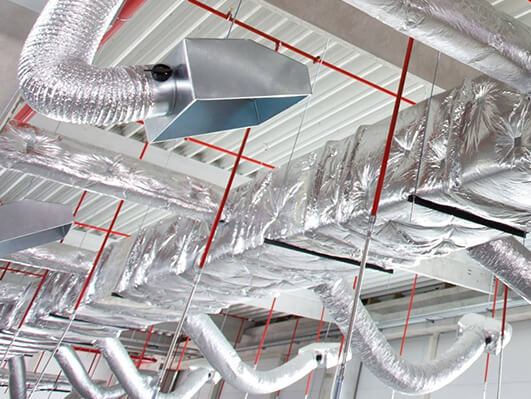
Why Work With Advanced Insulation Solutions?
When searching for “Commercial HVAC Insulation Denver, CO”, choose Advanced Insulation Solutions for:
- Industry Leading Expertise: Our decade-plus of specialization allows us to determine ideal insulation needs for maximum ROI.
- Fiberglass & Other Top Materials: We utilize quality fiberglass and other high-grade insulation materials designed to endure.
- Custom Approach: Each project is unique. We tailor our process to your commercial building's needs.
- Energy Savings: Proper insulation greatly reduces HVAC energy demands and lowers utility bills.
- Improved Comfort: Our insulation services combat temperature fluctuations for comfort.
- Satisfaction Guarantee: We stand behind our commercial insulation workmanship.
Call (720) 990-1332 for premier Denver, CO commercial HVAC insulation services tailored to your property’s needs!
Comprehensive HVAC System Insulations Services
Our team specializes in fiberglass insulation perfect for enabling HVAC systems to operate efficiently in commercial settings. Services our Denver insulation company provides for commercial buildings include:
HVAC Duct Insulation
- Installing new duct insulation
- Replacing damaged, missing or underperforming duct insulation
- Ensuring proper R-value for your climate and goals
- Reducing energy loss from air transfer
- Preventing condensation buildup
Furnace Insulation
- Enclosing furnaces fully to optimize heat containment
- Using proper thickness and rated materials
- Allowing accessibility for maintenance
- Increasing furnace performance and longevity
Pipe Insulation
- Insulating main HVAC piping throughout buildings
- Tailoring thickness to pipe size and temperature
- Sealing joints neatly to prevent efficiency losses
- Accessing hard-to-reach areas with precision
Chiller/Boiler Insulation
- Locking in frigid temperatures for chiller efficiency
- Enabling boilers to rapidly reach optimal temperature
- Covering odd shapes fully without restricting access
- Withstanding high heat temperatures over time
Why Proper Commercial HVAC Insulation Matters
Insulation shields your commercial HVAC components, allowing systems to operate more efficiently. Some key reasons why adequate insulation is vital include:
Optimizing HVAC Functionality
- Stabilizes System Cycling: Insulation prevents rapid temperature changes to minimize HVAC cycling on and off. Systems maintain interior comfort longer without requiring full power.
- Allows Desired Temps: Well-insulated units quickly reach and hold intended temps rather than overworking to compensate for uninsulated energy losses.
Increased Energy Efficiency
- Cuts Energy Waste: Insulation contains treated interior air and chilled or heated output from being absorbed by building materials or escaping outdoors.
- Lower Energy Bills: By requiring less run time, properly insulated HVAC systems greatly reduce monthly energy demands and expenses.
Enhanced Interior Comfort
- Minimizes Temperature Swings: Proper insulation offsets periods between system cycles. Buildings feel closer to the thermostat's set point longer.
- Prevents Condensation: Water from contact with cold ducts or pipes raises humidity and causes mold issues. Insulation acts as a barrier.
- Lessens Noise: Fiberglass and other commercial insulation help muffle HVAC system sounds for improved comfort.
Extended Equipment Lifespan
- Reduces Strain: Optimized insulation minimizes the strain HVAC components endure from overworking. Systems last decades rather than years.
- Lowers Maintenance: Once insulation seals conditioned air pathways, HVAC systems require less frequent servicing and repairs.
Bottom Line: Investing in professional insulation for commercial HVAC allows buildings to maintain comfort, efficiency, cost savings, and system integrity over the long term.
Why Fiberglass Insulation?
Fiberglass reigns as the most common insulation used in commercial buildings today. Reasons it remains a top choice HVAC insulant include:
Effectiveness
- Filters Air: The many fibers of spun or blown-in fiberglass insulation allow air to pass through while containing comfortable temperatures.
- Customizable Density: We determine ideal density and R-values matched to your climate and seasonal demands.
- Sound Absorption: Fiberglass insulation helps muffle HVAC system noise for improved comfort and focus.
- Moisture Resistance: Treated for water repellency, it won't easily absorb condensation or promote mold growth.
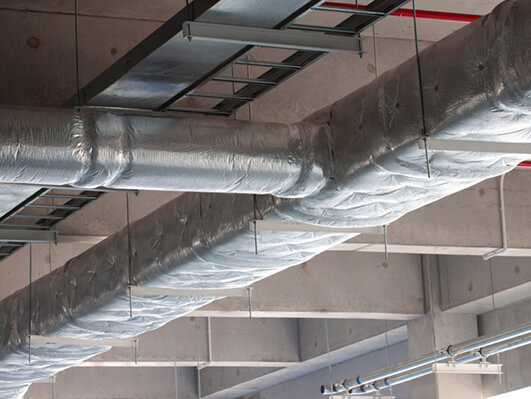
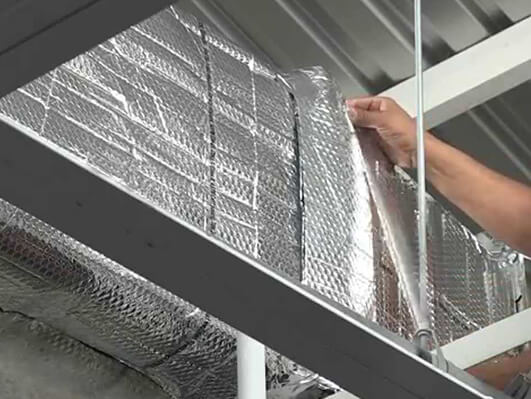
Ease of Installation & Access
- Malleable Material: Easily forms around commercial ductwork, piping, equipment and complex areas.
- Non-Damaging: Fiberglass won't corrode metal or damage HVAC components.
- Removable: No permanent binders allow simple replacement during equipment maintenance.
- Leave As Is: Can safely remain untouched when upgrading HVAC systems.
Affordability & Attainability
- Budget Friendly: Compared to closed-cell foam or other insulants, fiberglass averages lower cost.
- Widely Available: As a common building material, contractors can quickly acquire quality brands.
- Qualifies for Rebates: Energy efficient fiberglass may meet requirements for rebates and tax incentives.
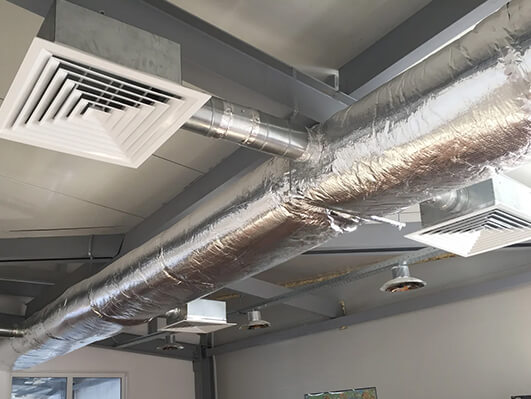
Key Aspects of Our Commercial Fiberglass Insulation Process
While each commercial building and HVAC system has unique needs, you can expect exceptional attention to detail and practices like:
Thorough Evaluation
- Inspecting all areas requiring insulation
- Testing for existing insulation R-values
- Identifying gaps, degradation and high loss areas
- Documenting tricky access points
- Determining required insulation type and thickness
Precise Installation
- Covering intended components completely
- Achieving full contact with sealed seams
- Fastening neatly without compressing depth
- Aligning insulation direction properly
- Leaving appropriate clearances for flues
Quality Craftsmanship
- Utilizing high grade, long lasting insulation materials
- Sizing all pieces and density to application
- Cutting all vapour barriers cleanly
- Sealing neatly with code-approved products
- Ensuring suitable mechanisms support weight
Ongoing verification
- Monitoring effectiveness with thermal imaging
- Adjusting for optimal efficiency achievement
- Repairing any incidental installation flaws
- Providing documentation for building records
By specializing in commercial HVAC insulation services for over 10 years, Advanced Insulation Solutions has the expertise to maximize energy efficiency and cost savings.
Realize Better HVAC Efficiency With Premier Insulation
If your Denver, CO commercial building could benefit from enhanced fiberglass HVAC insulation, contact Advanced Insulation Solutions for a free estimate at (720) 990-1332 or request a quote online. Our team looks forward to optimizing comfort and system performance through premium insulation!
What Factors Impact Insulation Needs?
Achieving ideal commercial HVAC insulation requires consideration of variables like:
Building Size & Layout
Larger structures with extensive ductwork and numerous HVAC components require ample insulation to seal energy escapes. Facility design also affects needs. For example, a compact single story office spaces may need less than a sprawling multi-level hospital.
System Types
We determine recommendations based on installed equipment like central air, boilers, roof top units, mini splits and so on to match insulation performance.
Equipment Locations
Insulation needs fluctuate for interior furnace rooms versus rooftop units exposed to outdoor elements as well as buried pipes versus accessible basement equipment.
Climate Conditions
Denver, CO endures cold winters and hot summers. We consider insulation thickness and ratings to offset seasonal extremes and maintain interior conditions.
Occupancy Factors
The number of occupants and facility usage impact interior temperature and humidity needs. For example, industrial buildings require different insulation than densely packed office spaces.
Temperature Setpoints
Insulation recommendations align with thermostat set points for occupied and unoccupied hours tailored to your commercial property.
We evaluate all these factors and more during our initial inspection to recommend the optimal insulation upgrades for your Denver property’s needs.
Installation Areas Requiring Insulation
Some common commercial HVAC system areas we insulate for maximum efficiency include:

Ductwork
Supply and return ducts snake throughout buildings and require ample insulation to contain comfortable air as it circulates.

Furnaces & Boilers
Heating unit housings allow significant energy loss without proper enclosure insulation.

Plenum Spaces
This central chamber transitioning from ducts to vents loses much cold and heat without insulation.

Roof Jacks
Penetrations allowing drains often lack seals letting comfort leak outdoors.

Pipes & Pumps
Extended pump piping loops lose efficiency without tailored pipe insulation.

Valves
Accessible valves release energy and require covers or wraps.

Flanges
High loss metal flanges need insulation shields between joined duct and piping sections.

Hangers & Supports
Uninsulated fastener points conduct conditioned air out rapidly.

Vibration Isolators
These duct supports hover uninsulated above cold attics.

Trap Primer Piping
Small diameter pipes require slim insulation customization.
With a decade specializing in commercial HVAC insulation, our team identifies all vulnerable areas to seal using optimal materials and thickness.
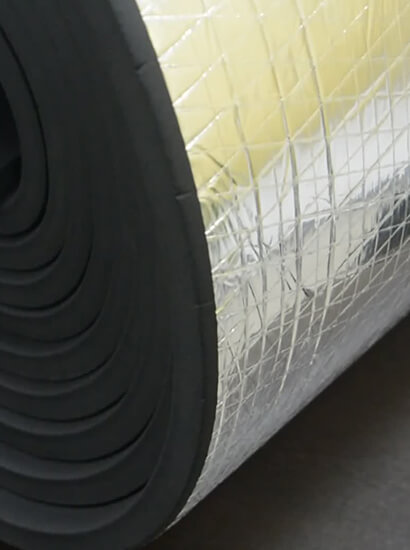
Common Insulation Materials We Utilize
Beyond traditional fiberglass, we utilize other insulation types suitable for commercial buildings like:
- Mineral Wool: Similar to fiberglass with excellent sound absorption, non-flammability and melting point exceeding 2,150° F. Useful for equipment rooms and rooftop units.
- Elastomeric Foam: This flexible, durable closed-cell foam suits pipes and unusual contours well. It stretches to seal gaps thoroughly limiting air leaks.
- Polyethylene Foams: This resilient plastic foam works well for irregular commercial ductwork and pipes in corrosive locations thanks to its moisture resistance.
- Calcium Silicate: A strong rigid insulation capable of extremely high temperatures beyond 1,800° F making it ideal for pipes, boilers and other hot equipment.
- Spray Foam: Sealing air leaks thoroughly, this foaming insulation works well for perimeter joists, electrical boxes, plumbing openings and holes allowing convection losses.
With many insulation products at our disposal, we determine what suits each application best based on temperature, location, severity of air loss and other factors.
Major Benefits of Professional Insulation
Beyond what we outlined already, top reasons for businesses in Denver, CO to utilize our commercial insulation services include:

Better Temperature Regulation
Well-insulated HVAC systems evenly sustain comfortable temperatures with minimal fluctuation.

Greater HVAC Capacity
Once sealed from leaks, systems can utilize full output to rapidly achieve and maintain set temps instead of constantly struggling to compensate for losses.

Improved Indoor Air
Consistent interior temperatures and enclosed ductwork provide better indoor air quality with fewer contaminants.

Enhanced Property Value
Upgraded insulation raises commercial building value by certifying energy efficiency and offsets outdates equipment.

Tax Incentives
Documented HVAC insulation upgrades may qualify your property for tax rebates and incentives for enhancing sustainability.

Extended Roof Life
Protecting equipment from temperature extremes and sealing openings helps commercial roof membranes last decades longer before needing replacement.

Reduced Maintenance
With equipment functioning at optimal efficiency, commercial HVAC systems require far less frequent servicing and break down less often.

Maximized Functionality
Insulated systems more readily provide appropriate heating, cooling, humidity control and air circulation building occupants require for comfort and productivity.

Lower Operating Costs
Cutting monthly energy bills saves thousands long term and allows businesses to reallocate funds to growth or other investments.
For any commercial facility in Denver, CO, proper insulation helps sustain ideal interior conditions while enabling HVAC equipment to function at peak performance for its lifespan.
Outdoor Insulation Applications
Beyond insulating indoor HVAC components, our services also enhance efficiency outdoors by:
- Roof Mount HVAC Units: Safeguarding packaged units atop commercial roofs properly seals interior air loss and entry points vulnerable to outdoor air incursion.
- Condensing Units: Insulating these exterior AC components prevents uncomfortable blasts while improving heat transfer efficiency through refrigeration lines.
- Heat Trace Cable: Wrapping pipes containing heated fluids or coils prevents snow/ice buildup blocking flow while avoiding energy waste.
- Roof Ventilation: Capping open hoods and commercial kitchen vents better contains expensive heated or cooled loss through fans.
- Service Door Perimeters: Installing insulation bordering doors to mechanical rooms seals gaps letting temperatures fluctuate drastically.
- Equipment Pads: Covering AC unit footer pads prevents conductive heat transfer through metal-to-concrete contact.
While indoor insulation offers major efficiency perks, protecting exterior HVAC appliances also provides substantial energy and cost savings year over year.
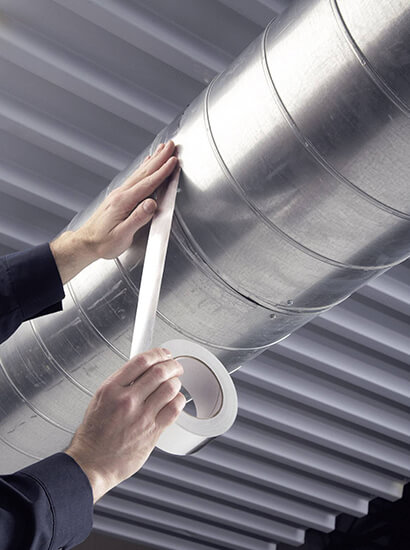
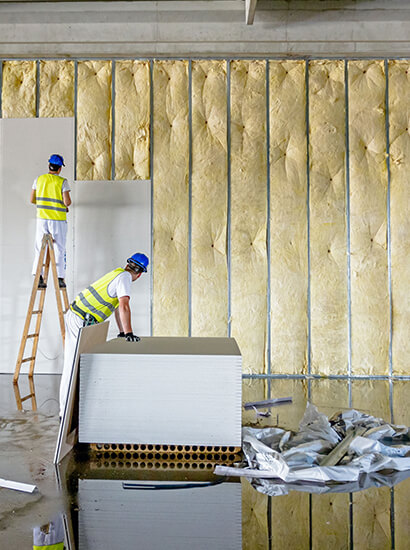
Additional Insulation Services Available
Beyond commercial HVAC insulation, Advanced Insulation Solutions also provides these services for Denver, CO businesses:
- Attic Insulation: Adding blown-in fiberglass attic insulation to suggested depth levels greatly reduces building heat transfer preventing energy loss into attics.
- Wall Insulation: Injecting wall cavity insulation optimizes insulation levels and building envelope integrity reducing hot/cold transfer.
- Basement Insulation: Framing basement walls with foam boards before finishing prevents ground temperature transfer upward into interiors.
- Crawlspace Insulation: Encapsulating dirt crawlspace floors with long lasting vapor barriers creates an air seal retaining conditioned air.
- Fireproofing: Protecting ducts, steel and equipment with fire rated insulation reduces fire risks and prevents collapse in emergencies allowing safe egress.
- Acoustic Insulation: Strategically placed sound absorption insulation offsets noisy mechanical equipment allowing improved concentration.
Visit our commercial insulation page for details on any of these other services available from our experienced team based in Denver.
Improve HVAC Efficiency Through Premier Insulation
Don’t leave commercial HVAC equipment subject to energy loss, moisture damage, operational strains and more without proper insulation. Advanced Insulation Solutions offers cost effective fiberglass and other insulation materials designed to seal conditioned air pathways.
To learn more about optimizing efficiency in your Denver, CO commercial building with certified HVAC insulation services, call (720) 990-1332 or request your free quote online to get started!

